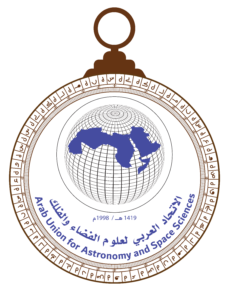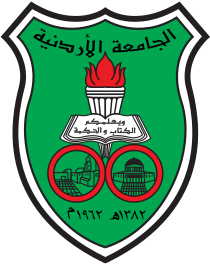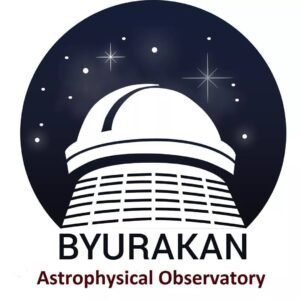Organizing Institutions

The Arab Union for Astronomy and Space Sciences (AUASS) is a specialized, non-governmental organization established in 1998 and headquartered in Amman, Jordan. It operates under the umbrella of the Arab Economic Unity Council of the Arab League and is a recognized member of the International Astronomical Union (IAU). Through its regional and international engagements, AUASS plays a pivotal role in advancing the scientific standing of the Arab world in the fields of astronomy and space sciences.
Mission and Objectives
1. Fostering Scientific Cooperation Among Arab Countries
AUASS is committed to strengthening collaboration among Arab nations by facilitating joint research initiatives, scientific programs, and cross-border partnerships that unite astronomers, researchers, and institutions.
2. Advancing Research and Education
The Union actively promotes scientific and technological research in astronomy and space sciences. It organizes conferences, symposia, and workshops to elevate academic standards, foster innovation, and encourage the exchange of ideas and expertise.
3. Public Outreach and Awareness
AUASS is dedicated to disseminating astronomical knowledge and promoting public interest in space sciences. It works to increase scientific literacy and awareness within Arab societies and encourages the integration of modern technologies in educational and outreach efforts.
Core Activities
Organizing Scientific Events
AUASS hosts a range of scientific gatherings—conferences, seminars, and forums—across the Arab region. These platforms serve as vital venues for sharing discoveries, discussing emerging topics, and networking among professionals.
Supporting Research and Innovation
By initiating and supporting collaborative research projects, AUASS contributes to the development of scientific knowledge and the generation of innovative solutions in astronomy and related technologies.
Capacity Building and Training
The Union implements training and development programs tailored to students, early-career researchers, and professionals. These programs are designed to enhance technical skills and build regional expertise.
International Partnerships
AUASS actively seeks partnerships with international organizations, including the IAU, to foster global knowledge exchange and facilitate access to advanced research tools, methodologies, and collaborative opportunities.
Membership and Institutional Framework
AUASS is formally affiliated with the Arab Economic Unity Council and maintains strong institutional ties across the Arab region. Its membership in the IAU amplifies its global engagement and helps integrate Arab scientific efforts into the international astronomical community.
The Arab Union for Astronomy and Space Sciences continues to serve as a cornerstone institution for the advancement of astronomy and space sciences in the Arab world. Through strategic collaborations, scientific leadership, and community outreach, AUASS is committed to empowering Arab nations to contribute meaningfully to the global scientific landscape.

Founded in 1962 in Amman, the University of Jordan (UJ) is the oldest and largest institution of higher education in the Hashemite Kingdom of Jordan. Since its establishment, UJ has grown to become a leading academic and research institution in the Arab world, known for its commitment to academic excellence, innovation, and societal development.
Vision and Mission
The University of Jordan aims to produce highly qualified graduates equipped with knowledge, skills, and creativity, while fostering an environment of advanced learning and research. Its vision is to achieve global leadership and excellence in education, scientific research, and community service.
Academic Programs
UJ offers a wide array of academic programs across various levels:
Undergraduate Programs: More than 90 bachelor’s programs in fields such as engineering, medicine, science, humanities, law, business, and information technology.
Graduate Studies: Over 100 master’s, doctoral, and higher diploma programs designed to meet the needs of academic and professional development.
Continuing Education: Specialized centers offer professional training and lifelong learning opportunities to serve local and regional communities.
Scientific Research and Innovation
As a hub for scientific research in the region, UJ hosts numerous advanced research centers and institutes. It supports interdisciplinary research initiatives, encourages scholarly publications, and promotes partnerships at national and international levels to drive innovation and discovery.
Accreditation and Rankings
The University of Jordan holds both national and international accreditation and is consistently ranked among top institutions in the region by global ranking systems such as the QS World University Rankings. Several of its programs have received international accreditation for academic quality and excellence.
Global Partnerships and Internationalization
UJ maintains active collaborations with over 100 universities and research institutions worldwide. It participates in international exchange programs, joint research projects, and academic networks, reflecting its strong global presence and commitment to international standards.
The University of Jordan remains a beacon of knowledge and a pillar of academic and scientific advancement in the Arab world, continually striving to shape the future through education, research, and service.

The University of Sharjah, established in 1997 and located in the Emirate of Sharjah, United Arab Emirates, is one of the region’s leading academic institutions. The university offers a comprehensive range of accredited undergraduate and postgraduate programs across multiple disciplines. Renowned for its commitment to academic excellence, research, and community service, the University of Sharjah provides a dynamic learning environment supported by modern infrastructure and state-of-the-art facilities.
Sharjah Academy for Astronomy and Space Technology
The Sharjah Academy for Astronomy and Space Technology is a specialized academic and research center affiliated with the University of Sharjah. It was founded with the mission of advancing education, research, and innovation in the fields of astronomy and space technology. The Academy plays a vital role in promoting scientific knowledge and contributing to the development of the regional and international space science community.
Main Objectives
Delivering advanced academic programs in astronomy and space technology.
Supporting cutting-edge scientific research and development in astronomy and space sciences.
Fostering international collaborations to enhance knowledge exchange and technological advancement.
Key Activities
Organizing scientific conferences, seminars, and symposia in space sciences.
Conducting specialized training programs and workshops for students, researchers, and professionals.
Participating in national and international research and development initiatives.
Both the University of Sharjah and the Sharjah Academy for Astronomy and Space Technology are committed to fostering innovation, scientific excellence, and leadership in education and research, particularly in the rapidly evolving domains of astronomy and space science.

The Byurakan Astrophysical Observatory (BAO) is one of the most prominent astronomical research institutions in the region, located near the village of Byurakan in Armenia. It was founded in 1946 by the renowned Armenian astrophysicist Viktor Ambartsumian, and it quickly rose to international recognition for its contributions to astrophysics, especially in the fields of stellar evolution and extragalactic astronomy.
Mission and Legacy
The observatory’s mission is to conduct advanced research in astronomy and astrophysics, foster international scientific collaboration, and support the training of young scientists. BAO holds a significant legacy as a center for breakthrough discoveries, most notably the identification of stellar associations and the development of theoretical models of active galaxies.
Research Focus Areas
Stellar Astronomy and Star Formation
Galaxies and Active Galactic Nuclei (AGN)
Cosmology and the Large-Scale Structure of the Universe
Astroinformatics and Data Analysis in Astronomy
Facilities and Equipment
BAO is equipped with several powerful telescopes, including the historic 2.6-meter Cassegrain reflector—one of the largest in the region. The observatory also maintains advanced data processing centers and archives of astronomical observations that are used by researchers worldwide.
Scientific and Educational Role
Hosting international conferences, symposia, and workshops.
Providing training opportunities for students and early-career researchers.
Promoting outreach and public education in astronomy across Armenia and beyond.
The Byurakan Astrophysical Observatory remains a vital hub for astronomical discovery and education, continuing its tradition of excellence and innovation in the service of science and humanity.
The International Astronomical Union (IAU) is the leading global organization dedicated to the advancement of astronomy in all its aspects, including research, education, and outreach. Founded in 1919 and headquartered in Paris, France, the IAU brings together over 13,000 professional astronomers from more than 100 countries. It operates under the International Science Council (ISC) and plays a central role in fostering international collaboration in the field of astronomy.
Mission and Objectives
Promoting International Cooperation in Astronomy
The IAU encourages global collaboration among astronomers and institutions to advance scientific discovery and understanding of the universe.
Defining Astronomical Standards
The IAU is the official authority responsible for naming celestial bodies and establishing standards in astronomical nomenclature and measurements.
Enhancing Astronomy Education and Outreach
The IAU works to improve public understanding and access to astronomy through global educational initiatives and outreach programs.
Key Activities
Scientific Symposia and General Assemblies
The IAU organizes major international conferences and symposia, including the triennial General Assembly, which gathers astronomers from around the world.
Research Commissions and Working Groups
It operates through scientific divisions and commissions focused on specialized areas such as planetary science, stellar astronomy, cosmology, and space exploration.
Public Engagement Programs
The IAU implements outreach initiatives such as the Office of Astronomy for Education (OAE) and the Office of Astronomy for Development (OAD) to support science education and sustainable development globally.
The International Astronomical Union continues to play a vital role in uniting the global astronomical community, setting scientific standards, and promoting astronomy as a tool for education, inspiration, and progress worldwide.

Network of Researchers on the Chemical Emergence of Life
NoRCEL is an international, interdisciplinary research network established in 2013, dedicated to exploring the chemical origins of life. It brings together experts in chemistry, biology, geosciences, space science, and philosophy to investigate how life may have emerged from non-living chemical systems on Earth and beyond.
The network promotes collaborative, open-access research and strives to close critical knowledge gaps in the field through global conferences, thematic workshops, and educational outreach. Its flagship initiatives include the Blue Earth Project (BEP)—focused on planetary sustainability—and the AstroScience Exploration Network (ASEN), which empowers early-career scientists, especially in the Global South, to engage in frontier research on astrobiology and life sciences.
As a co-organizer of the MEAEIM Conference, NoRCEL adds a unique scientific dimension that bridges fundamental origin-of-life research with environmental innovation, planetary science, and sustainable development. Its participation reflects MEAEIM’s commitment to multidisciplinary collaboration and inclusive global engagement in science.







